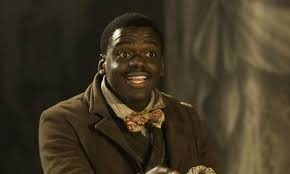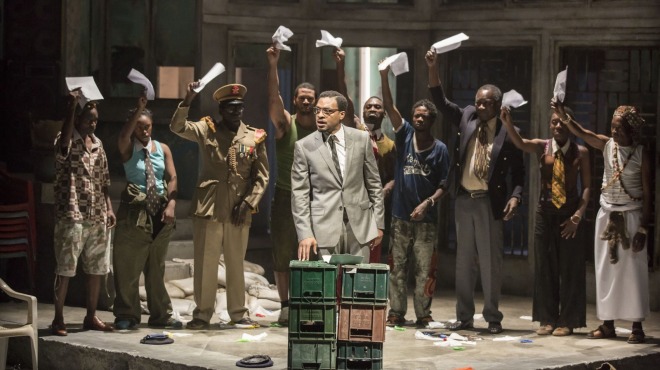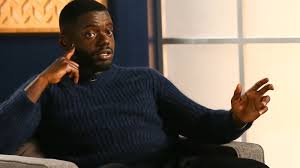 It is a long time since I last wrote a blog about Daniel Kaluuya. I meant to give my views on Get Out. But I was stopped in my tracks by Daniel himself.
It is a long time since I last wrote a blog about Daniel Kaluuya. I meant to give my views on Get Out. But I was stopped in my tracks by Daniel himself.
On Stephen Colbert’s The Late Show he spoke about how ‘white people say weird stuff‘. He is referring to a conversation in which a white woman started explaining what racism is, in a one-to-one dialogue with him.
This struck a bell with me as I realised that I had been trying to do this very thing in my earlier blogs – the Kaluuya Challenge and is it cos I is black? As a white woman, I had been trying to point out the ways in which racism was being experienced by, Daniel Kaluuya, a black man.
I was silenced and wrote no more about him. I did however do an interview for BBC Radio 4 in which I spoke about him. In it I described Daniel’s feeling of always being ‘other’.
As a man with Ugandan heritage he is blacker than most English black people.
As a black person he is not white.
As an English person he is not American enough for black Americans.
He uses the word ‘alienated’ to talk about his position in the world. Of the movie Black Panther he says that for the first time in his life, moving about the set, he felt ‘like I belong’. Some months previously, however, one of his American ‘brothers’, Samuel L. Jackson objected to Daniel being cast as Chris Washington in Get Out because of his Englishness.
Jordan Peele, director and writer of Get Out, who first saw Daniel in Charlie Brooker’s ‘Fifteen Million Merits’ episode of Black Mirror, defended his choice by saying that Daniel was the best actor for the lead part. I have always thought that Daniel was the best actor for nearly any part and feel quite offended when I see him given parts as the ubiquitous black sidekick.
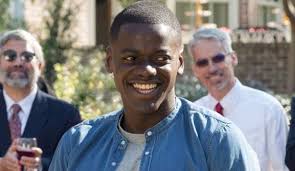
Peele wrote Get Out because he wanted to address a ‘void in the way we talk about racism’. He says that he wanted to give his truth as a black man. He speaks about the comments made to Daniel’s character, Chris Washington, at the garden party. These remarks he says seem ‘on the surface’ to be ‘ a harmless thing … but they are connected to the real, deep horror’ which is racism.

Peele speaks of the one black character in The Night of the Living Dead saying that the character is ‘ready to fight zombies because he’s been fighting white people off all his life’. Daniel agrees with Peele’s stance and states that Peele ‘cinematically articulated an experience that millions of people go through and they are made to feel crazy’.
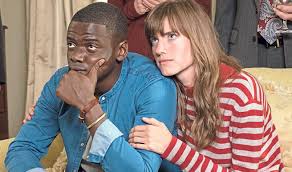
Peele reckons that the experience of watching Get Out is different for black and white people. He says that as soon as black people see the protagonist is dating a white woman, they say ‘Oh he’s in trouble. I don’t like where this is going… get out brother!’. For white people it’s different: ‘Oh my God, I think I’ve said that thing that the villains are saying in this movie’.
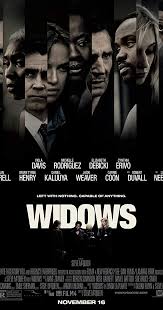
Now I have seen Daniel in Widows and I want to write about him again. Here, as in Get Out, he has the advantage of a black director in Steve McQueen. Unlike Get Out, which Peele describes as a documentary, Widows is a genre movie; it’s a heist.
The villains in Widows are extreme and caricatured. There is Robert Duval’s character, a racist bigot who regards black Americans as illegal immigrants and similar-to-rabbits in their ‘breeding habits’. There is the Liam Neeson character who betrays his devoted and moral wife (Viola Davis) in many and appalling ways. Daniel’s character, Jatemme, is a violent sadist. The other widows have each been victims of their husbands’ treachery in covert or overt acts of cruelty or neglect.

So McQueen is attacking more than racism in Widows. Mainly he is attacking the lack of agency which is caused by inequality and/or poverty. But disappointingly Jatemme does not address these issues. Daniel’s character lurks and sidles. Generally he is not centre stage. He is hidden behind his brother, Jamal, or his henchmen. His shadowy profile is half seen. He is a cypher. A one dimensional character. His name should be je te tue or je t’ai blessé rather than je t’aime. That’s what Jatemme does: he hurts and kills people. He does not love.
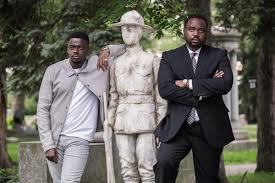
In an interview at the Toronto International Film Festival Daniel explains that Jatemme does what he thinks he has to do. Jatemme is as he is because of how he was brought up. And, says, Daniel, the despicable part of Jatemme is that he does not realise that he is despicable. The script writers, Steve McQueen and Gillian Flynn (Gone Girl and Sharp Objects), provide no backstory. Sidekick Jatemme’s amorality comes from Daniel’s work just as he had to create, Reggie, his sidekick character for Sicario or Colin Tucker in Johnny English Reborn.
It is extraordinary that so many reviewers of Widows pick out Daniel’s performance for special mention. He’s not even in the top billing list on the IMDb site. I suppose this proves just how extraordinary an actor he is, when in an ensemble piece, in which his part is a cartoonish sidekick, his excellence stands out.
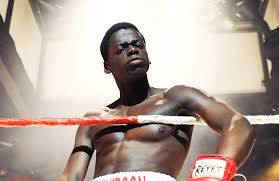
For Daniel acting techniques such as accents require drill. He needs to pay attention to such things as diction and projection. He has to keep himself physically fit. But he also has to use his imaginative skills to flesh out the, often two dimensional, characters he is given.
What he does not need to do is develop his pure talent as that has been there from childhood. Skins writer Bryan Elsley says that it was fun ‘to be briefly jogging beside Daniel, trying to keep up’. And Steve McQueen talks about the ‘truth’ of his acting, which he says is very rare. He continues ‘it’s in you, you can’t teach that’.
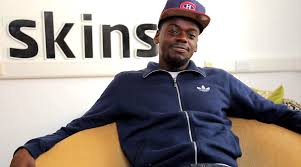
When people say to me that I must be proud of what I taught him I demur. I know that I did not teach him how to act. That was inside him. I did not teach him how to be the thoughtful, moral man that he is. His mother did that. All I could do was to recognise a peerless actor and support him in his endeavours. As much as I could, I protected him from an education system which conspired to constrain him.
On The Late Show Daniel said that ‘people talk to me in London slang but they shouldn’t because I understand English… I’m bilingual’. He says in an audition filmed by W. Magazine, ‘Racism sucks, inn’t? It’s kind of fucking shit’. Daniel’s life is dedicated to realising his ambitions as an actor and as a black man. This is his mantra:
We got to keep going.
We got things to do.
We got to elevate.


 He seems to be hitting the ground running as a
He seems to be hitting the ground running as a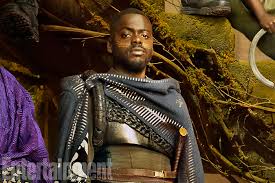 Although, unlike Black Panther, Get Out is not made entirely by black actors and black crew it is not, in my view, racist (although Kaluuya has something to say about white people like me policing racism i.e.
Although, unlike Black Panther, Get Out is not made entirely by black actors and black crew it is not, in my view, racist (although Kaluuya has something to say about white people like me policing racism i.e. 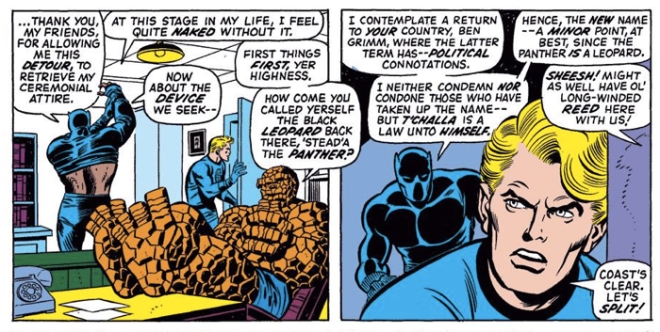
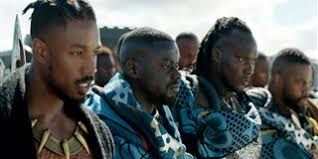
 His character changed his mind in an instant without any explanation. I felt that these was no underlying motivation to his role. I know, I know… It’s just a version of a comic. The war-rhino was a nice touch but Kaluuya isn’t really a horseman and didn’t look comfortable on it.
His character changed his mind in an instant without any explanation. I felt that these was no underlying motivation to his role. I know, I know… It’s just a version of a comic. The war-rhino was a nice touch but Kaluuya isn’t really a horseman and didn’t look comfortable on it.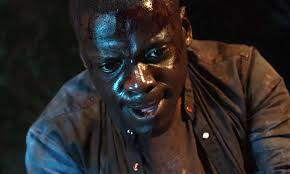
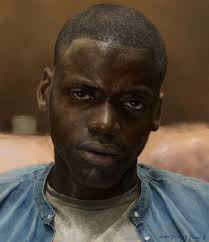 Kaluuya can communicate with his eyes, face, voice and body. He does not need the aid of arty lighting or camera angles to be terrifying.
Kaluuya can communicate with his eyes, face, voice and body. He does not need the aid of arty lighting or camera angles to be terrifying.
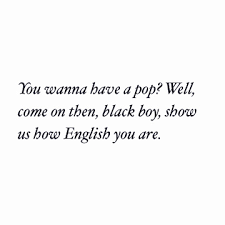 The play deals with football tribalism as well as racism. Daniel’s character, Mark, is an ex-soldier from the British army. The regulars at the King George Public House can’t get their heads around his Englishness. His colour is more apparent to them than his place of birth and his service to his country. I won’t say that this was an astonishing piece of casting by me but it was prescient in terms of what being black has been like for Daniel.
The play deals with football tribalism as well as racism. Daniel’s character, Mark, is an ex-soldier from the British army. The regulars at the King George Public House can’t get their heads around his Englishness. His colour is more apparent to them than his place of birth and his service to his country. I won’t say that this was an astonishing piece of casting by me but it was prescient in terms of what being black has been like for Daniel.

